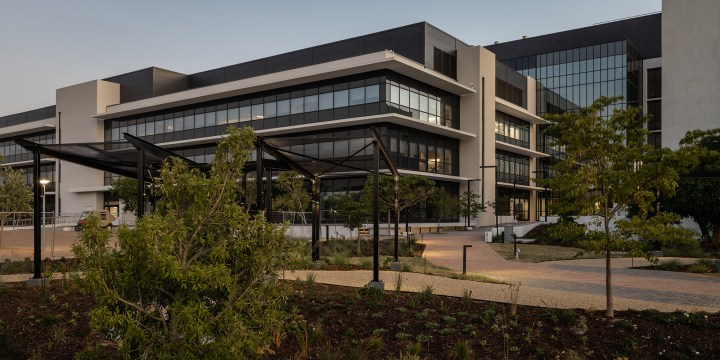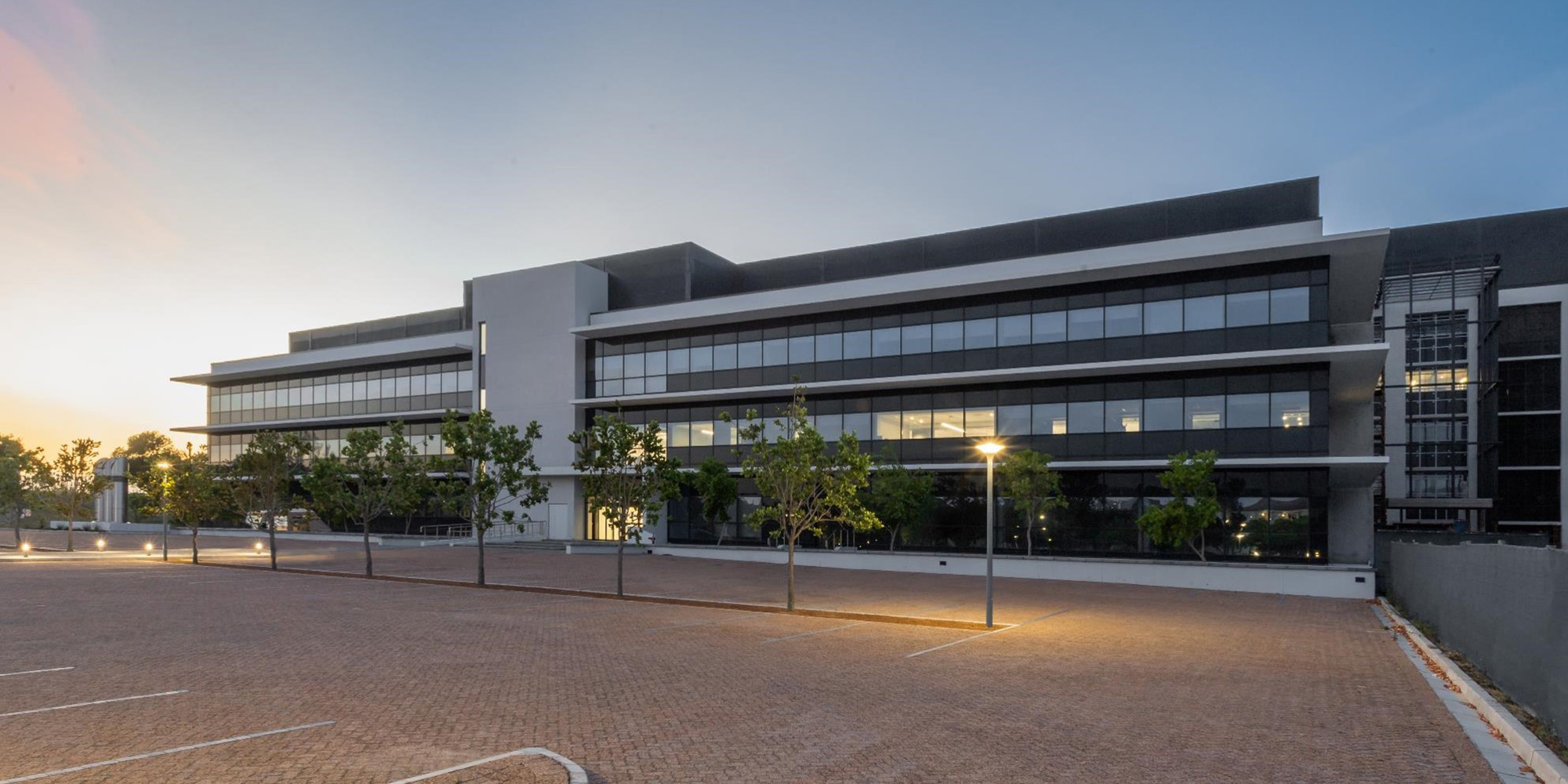BIOMED DEFENCE OP-ED
Stellenbosch University unveils R1.2-billion investment in biomedical science for Africa

A leading-edge biomedical research facility, the Biomedical Research Institute, was officially launched this week.
Doctors, nurses, and other healthcare workers are most often viewed as the heroes of healthcare. And while they undoubtedly play a crucial role in delivering treatment to patients (often selflessly and courageously under difficult circumstances), this paradigm does not account for the multitude of scientists and thousands of laboratory hours behind the research and development of every tablet, injection or medical device used to treat you, the patient.
To use a cycling metaphor — if healthcare workers are the cyclists, biomedical science is not only the bicycle they’re riding, but also the road, the road map, the construction worker who built the road, and the town planner who designed it.
Biomedical research has long been at the heart of sweeping changes to the practice of medicine and underpins new ground-breaking developments.
Immediately coming to mind is Sir Alexander Fleming’s almost forgotten Petri dish that led to the discovery of penicillin — the antibiotic touted as having saved more than 200 million lives over the past eight decades.
Or the discovery of insulin and consequent scientific developments enabling mass production of this hormone, making it accessible to millions of type 1 diabetes patients whose lives would otherwise have been cut short.
More recent developments include the development of 3D-printed medical devices that have revolutionised some fields of medicine. Some of the applications in use today include 3D-printed skin for burn victims; airway splints for lungs; noses and ears for cancer patients; heart valves; joint implants; and functional artificial hands.
Experimentally, spontaneously beating 3D-printed hearts have been produced, albeit for rabbits. In future, such developments could be game changers for the treatment of life-threatening conditions, like heart failure.
Biomedical science concerns itself with finding answers to medical questions and provides pieces of the puzzle that have been essential for the progress that we have seen over the past 100 years, accelerating dramatically over the past few decades.
Taken together, there are too many applications of biomedical sciences to mention. All preventive, diagnostic, therapeutic or treatment monitoring interventions have been channelled through biomedical science processes.
This includes vaccines, painkillers, new cancer treatments, contraceptives, antibiotics, nutritional support, cholesterol-lowering drugs, heart failure drugs, immune suppressive drugs, organ transplantation-related drugs and many more.

Stellenbosch University’s Biomedical Research Institute. (Photo: sun.ac.za)
Biomedical science in Africa
In South Africa, biomedical science was thrust onto the international stage during the recent Covid-19 pandemic, when genomic surveillance — conducted right here on the Cape Flats — enabled South African scientists to quickly identify the Beta and Omicron variants of Sars-CoV-2 and warn the rest of the world about the impending threat.
Covid-19 will not be the last pathogen to cause epidemics and pandemics. As was evident during the last epidemic, there are significant barriers to the rapid availability and sharing of available genomic data. The Network for Genomic Surveillance in South Africa (NGS-SA), established by Prof Tulio de Oliveira, a key member of the Biomedical Research Institute (BMRI), allows the combination of near-real-time genomic surveillance data with other epidemiological data and to rapidly analyse the data to produce actionable information for public health officials and policymakers.
Clear communication lines between scientists and policymakers in South Africa, Africa and the rest of the world will be essential for rapid responses, the formulation of public health interventions and monitoring of future pandemics, to prevent a repetition of the devastating economic and public health consequences that were seen during the Covid-19 pandemic.
Biomedical science for Africa
Africa has its own set of health challenges and needs to develop its own solutions that take African realities into account. These include a lack of infrastructure, such as transportation and cold chain challenges, affordability, disease profiles, such as higher prevalence of infectious diseases like TB, malaria and HIV, and population genetic makeup.
Simply relying on solutions developed in other areas for their own realities will not ensure that the most appropriate solutions are researched or adopted. Africa should not only be the recipient of biomedical technology, but also a provider of solutions.
An investment in biomedical research which is dedicated to understanding the genetic and bio-molecular basis of disease with a decidedly African focus will play a significant role in achieving this.
In addition, African researchers have a lot to offer to the world of biomedical sciences, particularly in the field of infectious diseases, where ground-breaking research on Sars-CoV-2, HIV and TB is being conducted.
The BMRI will allow significant human capacity development through training some of the best students from the continent and exposing them to extensive national and international research networks to result in the next generation of successful scientists.
Investing in biomedical science in and for Africa
Against the background of the many medical breakthroughs that have saved countless lives, Stellenbosch University’s investment of R1.2-billion in the BMRI is of huge significance for South Africa and the rest of Africa.
The more than 500 scientists at the BMRI conduct research which translates into discoveries that help improve the diagnosis, prevention and treatment of illnesses contributing most to morbidity and mortality in South Africa and Africa.
The BMRI consists of several state-of-the-art laboratories, including electron microscopy, proteomics, molecular biology, genetics, immunology, microbiology and Facs laboratories (for fluorescence-activated cell sorting); the largest fully automated biorepository on the African continent; a bioinformatics hub; and a clinical research unit.
It also hosts the SUNSkill facility that offers advanced surgical training to local and international specialists.
The immense value of the BMRI was recognised even before its completion in 2023, and high-profile visitors, including President Cyril Ramaphosa and WHO Director-General Dr Tedros Adhanom Ghebreyesus, came to view the facility in 2022.
The facility’s potential was endorsed when the Centre for Epidemic Response and Innovation (Ceri), located in the BMRI, was selected by the WHO as a partner member of the first Covid mRNA Vaccine Technology Transfer Hub.
The bicycle and the cyclist
But back to the cycling metaphor: Just like the bicycle would mean nothing without a willing and able cyclist, the solid foundation that biomedical sciences provide would be nothing without healthcare workers taking it to patients in need. DM
Prof Gerhard Walzl is Distinguished Professor at Stellenbosch University, head of the Division of Molecular Biology and Human Genetics, Executive Head of the Department of Biomedical Sciences, and holds an NRF SARChI award on TB biomarkers. He also leads the Stellenbosch University Immunology Research Group.


















 Become an Insider
Become an Insider
Comments - Please login in order to comment.